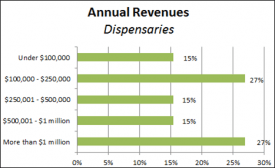Massachusetts marijuana entrepreneurs collectively groaned last month when the health department released draft regulations on the emerging medical cannabis industry. Under the proposed rules, applicants for dispensary permits would not only have to funnel $500,000 into an escrow account and submit extremely comprehensive business plans, they would also have to compete against out-of-state players.
If the state adopts these rules, the barriers to entry will be quite high. Smaller local players will have an extremely difficult time meeting the application requirements and getting final approval.
But that hasn’t deterred many entrepreneurs, at least so far. Hundreds of locals seem poised to put a lot of money, time and resources on the line for a shot at getting in on the ground floor of a new industry.
“There are a lot of people out there kicking the tires and others who are waiting on the sidelines ready to jump in,” said Bruce Bedrick, chief executive officer of MedBox, which develops automated cannabis dispensing machines and offers consulting services in new MMJ states. “I expect about a 10-to-1 ratio” of applicants to available dispensary permits.
On April 3, MedBox hosted free educational seminars in Boston focused on the proposed rules, drawing about 300 entrepreneurs throughout the day. Bedrick said most attendees had a relatively high level of familiarity with the draft regulations and were still interested in exploring opportunities to open a dispensary.
“Most of the questions asked were about fundamentals – the process and details – rather than generic questions about what the draft regulations contain,” Bedrick said.
Massachusetts has ranked as one of the hottest new medical cannabis markets ever since it passed a law in November allowing up to 35 dispensaries – much more than other MMJ states in New England. A handful of out-of-state players – including Colorado-based Denver Relief Consulting and the law firm Vicente Sederberg – are looking to tap this new market and assist locals who want to open medical cannabis businesses. Several of these firms and other organizations have hosted seminars and conferences to feed locals’ voracious appetite for information about running a medical marijuana operation.
Last month, the National Cannabis Industry Association held a business-focused symposium before the state released its draft rules, drawing more than 125 participants. The industry trade organization said it continues to see high levels of interest now that the proposed regulations are out.
“Individuals who we are connected to in the area are as interested as they were prior to the release of the rules,” said Betty Aldworth, deputy director of the NCIA.
Adam Fine, a Massachusetts attorney who is working with Vicente Sederberg, said he thinks interest has actually increased in the past two weeks.
“I would say it’s elevated,” Fine said. “I think that’s really the result of the comprehensive nature of the regulations and the fact that we now have a vision for what they will look like. It seems more real, and on balance I thought the regulations were well thought-out.”
Going forward, interest levels could hinge on the amount of fees and expenses tied to applying for and receiving a permit. The state’s health department did not offer any specific suggestions on this end, other than to say fees would be set down the road.
A few thousand dollars likely won’t affect entrepreneur interest. But if applicants have to shell out tens of thousands of dollars just to apply – which is a real possibility given the huge escrow proposal and the fact that other nearby MMJ states have high fees – many potential cannabis entrepreneurs will likely drop out. In fact, some observers think there will only be a couple dozen “serious” applicants in the end, which – if true – will narrow the competitive field significantly.
Regardless, it will likely be many months before dispensaries start opening up, meaning entrepreneurs who move forward will need a lot of patience. And even those with deep pockets and a wealth or resources to make it through the application process will face challenges.
“What I am seeing the most of are groups that are well capitalized but are deficient in the other two major areas: securing a cultivation or retail space (especially one that will conform to zoning regulations or meets with town approval), or technical expertise,” said Robert Hunt, who owns cultivation supply stores in several states and is also an MMJ consultant. “On both fronts it does not matter how well-funded these guys are, they are facing uphill battles.”




